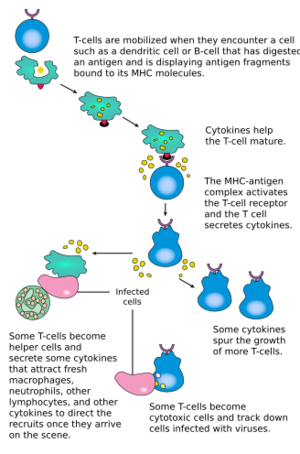T cell facts for kids
A T cell is a special kind of white blood cell called a lymphocyte. These tiny cells are super important for your immune system, which is like your body's defense team. T cells are like tiny soldiers that find and destroy bad guys, such as cells infected with viruses, cells that don't belong, or even cancer cells. The "T" in T cell stands for thymus. The thymus is a small organ where T cells grow up and learn how to do their job.
What are T Cells?
T cells are a key part of your body's defense system. They help protect you from sickness by recognizing and fighting off harmful invaders. When a T cell finds something dangerous, it can either attack it directly or send signals to other immune cells to join the fight.
Different Kinds of T Cells
There are several types of T cells, and each one has a special role in keeping you healthy:
- Cytotoxic T cells (also called Killer T cells): These T cells are like the direct attackers. They find and destroy cells that are infected with viruses or have become cancer cells. They are very good at targeting and eliminating threats.
- Helper T cells: These T cells are like the commanders of the immune system. They don't fight directly, but they help activate other immune cells, including Killer T cells and B cells (another type of white blood cell). They make sure the right cells are called into action.
- Regulatory T cells (also called Suppressor T cells): These T cells are like the peacekeepers. They help control the immune response and stop it from becoming too strong or attacking healthy parts of your own body. They make sure the immune system doesn't overreact.
- Natural Killer T cells (NKT cells): These T cells have some features of both T cells and natural killer cells (another type of immune cell). They can quickly recognize and kill infected or cancerous cells.
- γδ T cells (Gamma Delta T cells): These T cells are a less common type. They are often found in places like the skin and gut, and they act as an early warning system, responding quickly to infections or stress.
See also
 In Spanish: Linfocito T para niños
In Spanish: Linfocito T para niños
 | Percy Lavon Julian |
 | Katherine Johnson |
 | George Washington Carver |
 | Annie Easley |


